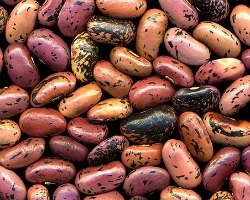
Which traditional food is inexpensive, packed with fiber and protein and can lower your risk of heart disease, diabetes, and colon cancer? Beans!
Beans are classified as legumes, a category which also includes peas and lentils. With over 13,000 species, the nutritional powerhouses pack more punch than most other foods, and with fewer calories to boot. About half a cup of cooked beans (approximately 100 grams) supplies anywhere from five to eight grams of fiber and about seven grams of protein (that’s equivalent to two portions of meat). Soybeans—which are sometimes referred to as the ‘vegetable cow’—are an exception, providing over fourteen grams of protein per half-cup serving.
Research has shown that diets rich in beans (eaten two or more times per week) may reduce cholesterol and blood pressure, improve colon health, reduce cancer risk, and the very low Glycemic Index rating of beans can help balance blood sugar in those with and without diabetes.
Beans are rich in antioxidants and have high levels of phytoestrogens, compounds that are similar in structure to estrogen which help to reduce symptoms of menopause and may reduce the risk of certain cancers, improve bone health, and reduce one’s heart disease risk. In 2011, a study showed that subjects who regularly replaced white rice with beans had lower cardiometabolic risk factors—higher levels of HDL (the ‘good’ cholesterol) and lower diastolic blood pressure—than those who ate white rice more often.
Dried Beans vs. Canned Beans?
Nutritionally speaking, canned beans and dried beans are comparable in terms of calories, protein, fat, fiber, and carbohydrates. They differ in two ways: canned beans contain much higher levels of sodium—up to 1,200 mg per cup—whereas dried beans contain no sodium unless it’s added during the cooking process. Also, most brands of canned beans contain the preservative and chelating agent, calcium disodium EDTA, which is added to protect the colour of the beans and eliminate any potential taste of metal from the can. Though EDTA is considered safe for use, it has been found to be toxic to cells and potentially carcinogenic in lab animals. It’s also a persistent organic pollutant, collecting in groundwater and having the potential to carry heavy metals back into our drinking water. Rinsing beans well before using doesn’t remove the EDTA but greatly reduces the amount of sodium. (To learn more about preservatives found in food, click here.)
Avoid buying canned beans in sauces that can’t be rinsed off, for example, beans in tomato sauce, baked beans, pork and beans, and refried beans.
With so many ways to enjoy them, there’s really no reason why beans can’t be regulars at meal time. They’re delicious in main dishes—in wraps and chilli, bean stews and casseroles, bean soups, bean salads and baked beans; and they’re just as appetizing as sides—over salads or as dips with vegetables or tortilla chips. Bean flours are also available for making gluten-free and protein-rich breads, muffins, cookies, and even pasta.
Beans, Beans, The Musical Fruit
If gas production sits between you and regular bean consumption, prepare your meal with herbs, spices, and seaweeds that are traditionally used to reduce gas. These include anise, caraway seeds, cumin, garlic, fennel seeds, rosemary, turmeric, lemongrass, coriander, and kelp.
Digestive enzymes can be taken just before eating beans to prevent gas. Look for products containing alpha-galactosidase, amylase, and cellulose, or enzyme formulations specifically designed to digest beans.
Soaking dried beans for several hours before cooking is helpful as well. Beans contain high levels of phytic acid, or phytates, which can cause gas, bloating, and intestinal discomfort. Thorough soaking reduces the phytates and releases the nutrients ‘trapped’ inside the bean.
Puréed beans and bean dips are easier to digest than whole beans.
Bean Recipes
Zippy Bean Stew
Barley Bean Soup
How To Cook Black Beans
References:
Natural News: Beans: Fabulous Health Benefits, Weight Management and Nutrition at a Very Low Cost
Livestrong: Dried Beans vs. Canned Beans for Nutritional Value
A Consumer's Dictionary of Food Additives By Ruth Winter p233.
Rev Environ Contam Toxicol. 1997;152:85-111. Environmental fate of EDTA and DTPA. Sillanpää M.
Mattei J, Hu FB, Campos H. A higher ratio of beans to white rice is associated with lower cardiometabolic risk factors in Costa Rican adults. Am J Clin Nutr. 2011; 94: 869-76.
Bean Institute: Latest Research
photo credit: he_boden/cc by-nc 2.0










